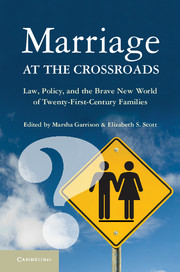Book contents
- Frontmatter
- Contents
- Contributors
- Acknowledgments
- Introduction
- Part I History, Demographics, and Economics – Multiple Perspectives on Families
- 1 Red v. Blue Marriage
- 2 International Family Change and Continuity
- 3 The Division of Household Labor across Time and Generations
- 4 Marriage at the Crossroads in England and Wales
- 5 The Curious Relationship of Marriage and Freedom
- Part II Empirical Research on Family Change
- Part III Family Policy and Law for the Twenty-First Century
- Comments
- Index
- References
2 - International Family Change and Continuity
The Past and Future from the Developmental Idealism Perspective
Published online by Cambridge University Press: 05 November 2012
- Frontmatter
- Contents
- Contributors
- Acknowledgments
- Introduction
- Part I History, Demographics, and Economics – Multiple Perspectives on Families
- 1 Red v. Blue Marriage
- 2 International Family Change and Continuity
- 3 The Division of Household Labor across Time and Generations
- 4 Marriage at the Crossroads in England and Wales
- 5 The Curious Relationship of Marriage and Freedom
- Part II Empirical Research on Family Change
- Part III Family Policy and Law for the Twenty-First Century
- Comments
- Index
- References
Summary
INTRODUCTION
To look forward, as the crossroads metaphor of this volume suggests, we must consider the forces that brought us to the present. Also, we live in a globalized world and should take an international perspective, which requires national and subnational perspectives. This is an impossibly difficult task, but the advantages of an international perspective are well worth the downside associated with falling short. With both historical and international perspectives, I must describe things in very general terms, and examples and details must be limited.
Many material and ideational forces have produced current marriage and family patterns, and many forces will shape the future. I focus on ideational or cultural factors, with an emphasis on developmental idealism, because these factors are important and have not received adequate attention. My focus on the ideational does not suggest that I believe other factors are not important, as I believe that a full understanding of family change requires consideration of a broad range of ideational and material factors and their intersections.
- Type
- Chapter
- Information
- Marriage at the CrossroadsLaw, Policy, and the Brave New World of Twenty-First-Century Families, pp. 30 - 53Publisher: Cambridge University PressPrint publication year: 2012
References
- 3
- Cited by



